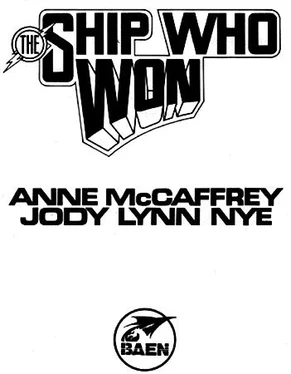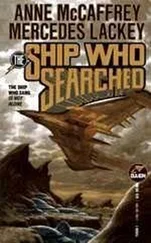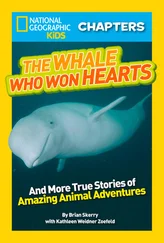Энн Маккефри - The Ship Who Won
Здесь есть возможность читать онлайн «Энн Маккефри - The Ship Who Won» весь текст электронной книги совершенно бесплатно (целиком полную версию без сокращений). В некоторых случаях можно слушать аудио, скачать через торрент в формате fb2 и присутствует краткое содержание. Год выпуска: 1994, ISBN: 1994, Издательство: Baen, Жанр: Фантастика и фэнтези, на английском языке. Описание произведения, (предисловие) а так же отзывы посетителей доступны на портале библиотеки ЛибКат.
- Название:The Ship Who Won
- Автор:
- Издательство:Baen
- Жанр:
- Год:1994
- ISBN:0-671-87595-7 / 978-0-671-87595-4
- Рейтинг книги:3 / 5. Голосов: 1
-
Избранное:Добавить в избранное
- Отзывы:
-
Ваша оценка:
- 60
- 1
- 2
- 3
- 4
- 5
The Ship Who Won: краткое содержание, описание и аннотация
Предлагаем к чтению аннотацию, описание, краткое содержание или предисловие (зависит от того, что написал сам автор книги «The Ship Who Won»). Если вы не нашли необходимую информацию о книге — напишите в комментариях, мы постараемся отыскать её.
The Ship Who Won — читать онлайн бесплатно полную книгу (весь текст) целиком
Ниже представлен текст книги, разбитый по страницам. Система сохранения места последней прочитанной страницы, позволяет с удобством читать онлайн бесплатно книгу «The Ship Who Won», без необходимости каждый раз заново искать на чём Вы остановились. Поставьте закладку, и сможете в любой момент перейти на страницу, на которой закончили чтение.
Интервал:
Закладка:
To date, the CK's one reasonable hope of finding an equal or superior species came five years and four months before, when they had intercepted a radio transmission from a race of beings who sounded marvelously civilized and intelligent. As Keff had scrambled to make IT understand them, he and Carialle became excited, thinking that they had found the species with whom they could exchange culture and technology. They soon discovered that the inhabitants of Jove II existed in an atmosphere and pressure that made it utterly impractical to establish a physical presence. Pen pals only. Central Worlds would have to limit any interaction to radio contact with these Acid Breathers. Not a total loss, but not the real thing. Not contact.
Maybe this time on this mission into R sector, there would be something worthwhile, the real gold that didn't turn to sand when rapped on the anvil. That hope lured them farther into unexplored space, away from the known galaxy, and communication with friends and other B&B ship partnerships. Carialle chose not to admit to Keff that she was as hooked on First Contact as he was. Not only was there the intellectual and emotional thrill of being the first human team to see something totally new, but also the bogies had less chance of crowding in on her . . . if she looked farther and further ahead.
For a shellperson, with advanced data-retrieval capabilities and superfast recall, every memory existed as if it had happened only moments before. Forgetting required a specific effort: the decision to wipe an event out of ones databanks. In some cases, that fine a memory was a curse, forcing Carialle to reexamine over and over again the events leading up to the accident. Again and again she was tormented as the merciless and inexorable sequence pushed its way, still crystal clear, to the surface—as it did once more during this silent running.
Sixteen years ago, on behalf of the Courier Service, she and her first brawn, Fanine, paid a covert call to a small space-repair facility on the edge of Central Worlds space. Spacers who stopped there had complained to CenCom of being fleeced. Huge, sometimes ruinously expensive purchases with seemingly faultless electronic documentation were charged against travelers' personal numbers, often months after they had left SSS-267. Fanine discreetly gathered evidence of a complex system of graft, payoffs and kickbacks, confirming CenCom's suspicions. She had sent out a message to say they had corroborative details and were returning with it.
They never expected sabotage, but they should have—Carialle corrected herself: she should have—been paying closer attention to what the dock hands were doing in the final check-over they gave her before the CF-963 departed. Carialle could still remember how the fuel felt as it glugged into her tank: cold, strangely cold, as if it had been chilled in vacuum. She could have refused that load of fuel, should have.
As the ship flew back toward the Central Worlds, the particulate matter diluted in the tanks was kept quiescent by the real fuel. Gradually, her engines sipped away that buffer, finally reaching the compound in the bottom of her tanks. When there was more aggregate than fuel, the charge reached critical mass, and ignited.
Her sensors shut down at the moment of explosion but that moment—10:54:02.351—was etched in her memory. That was the moment when Fanine's life ended and Carialle was cast out to float in darkness.
She became aware first of the bitter cold. Her internal temperature should have been a constant 37В° Celsius, and cabin temperature holding at approximately twenty-one. Carialle sent an impulse to adjust the heat but could not find it. Motor functions were at a remove, just out of her reach. She felt as if all her limbs—for a brainship, all the motor synapses—and most horribly, her vision, had been removed. She was blind and helpless. Almost all of her external systems were gone except for a very few sound and skin sensors. She called out soundlessly for Fanine: for an answer that would never come.
Shock numbed the terror at first. She was oddly detached, as if this could not be happening to her. Impassively she reviewed what she knew. There had been an explosion. Hull integrity had been breached. She could not communicate with Fanine. Probably Fanine was dead. Carialle had no visual sensing equipment, or no control of it, if it still remained intact. Not being able to see was the worst part. If she could see, she could assess the situation and make an objective judgment. She had sustenance and air recirculation, so the emergency power supply had survived when ship systems were cut, and she retained her store of chemical compounds and enzymes.
First priority was to signal for help. Feeling her way through the damaged net of synapses, she detected the connection for the rescue beacon. Without knowing whether it worked or not, Carialle activated it, then settled in to keep from going mad.
She started by keeping track of the hours by counting seconds. Without a clock, she had no way of knowing how accurate her timekeeping was, but it occupied part of her mind with numbing lines of numbers. She went too quickly through her supply of endorphins and serotonin. Within a few hours she was forced to fall back on stress-management techniques taught to an unwilling Carialle when she was much younger and thought she was immortal by patient instructors who knew better. She sang every song and instrumental musical composition she knew, recited poems from the Middle Ages of Earth forward, translated works of literature from one language into another, cast them in verse, set them to music, meditated, and shouted inside her own skull.
That was because most of her wanted to curl up in a ball in the darkest corner of her mind and whimper. She knew all the stories of brains who suffered sensory deprivation. Tales of hysteria and insanity were the horror stories young shellchildren told one another at night in primary education creches. Like the progression of a fatal disease, they recounted the symptoms. First came fear, then disbelief, then despair. Hallucinations would begin as the brain synapses, desperate for stimulation, fired off random neural patterns that the conscious mind would struggle to translate as rational, and finally, the brain would fall into irrevocable madness. Carialle shuddered as she remembered how the children whispered to each other in supersonic voices that only the computer monitors could pick up that after a while, you'd begin to hear things, and imagine things, and feel things that weren't there.
To her horror, she realized that it was happening to her. Deprived of sight, other than the unchanging starscape, sound, and tactile sensation, memory drive systems failing, freezing in the darkness, she was beginning to feel hammering at her shell, to hear vibrations through her very body. Something was touching her.
Suddenly she knew that it wasn't her imagination. Somebody had responded to her beacon after who-knew-how-long, and was coming to get her. Galvanized, Carialle sent out the command along her comlinks on every frequency, cried out on local audio pickups, hoping she was being heard and understood.
«I am here! I am alive!» she shouted, on every frequency. «Help me!»
But the beings on her shell paid no attention. Their movements didn't pause at all. The busy scratching continued.
Her mind, previously drifting perilously toward madness, focused on this single fact, tried to think of ways to alert the beings on the other side of the barrier to her presence. She felt pieces being torn away from her skin, sensor links severed, leaving nerve endings shrieking agony as they died. At first she thought that her «rescuers» were cutting through a burned, blasted hull to get to her, but the tapping and scraping went on too long. The strangers were performing salvage on her shell, with her still alive within it! This was the ultimate violation; the equivalent of mutilation for transplants. She screamed and twitched and tried to call their attention to her, but they didn't listen, didn't hear, didn't stop.
Читать дальшеИнтервал:
Закладка:
Похожие книги на «The Ship Who Won»
Представляем Вашему вниманию похожие книги на «The Ship Who Won» списком для выбора. Мы отобрали схожую по названию и смыслу литературу в надежде предоставить читателям больше вариантов отыскать новые, интересные, ещё непрочитанные произведения.
Обсуждение, отзывы о книге «The Ship Who Won» и просто собственные мнения читателей. Оставьте ваши комментарии, напишите, что Вы думаете о произведении, его смысле или главных героях. Укажите что конкретно понравилось, а что нет, и почему Вы так считаете.





![Энн Маккефри - Неразлучная пара [= Неразлучные]](/books/252704/enn-makkefri-nerazluchnaya-para-nerazluchnye-thumb.webp)

